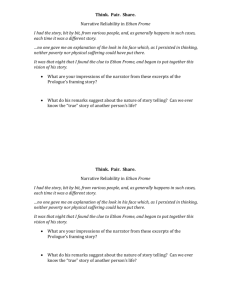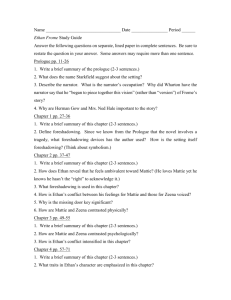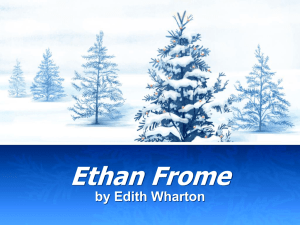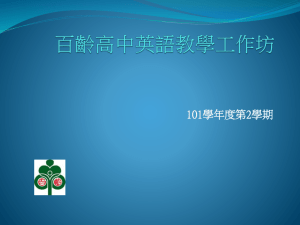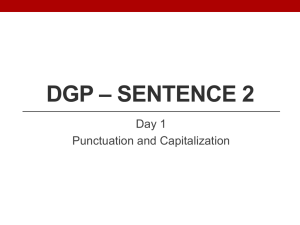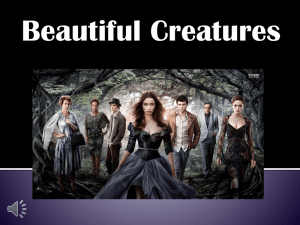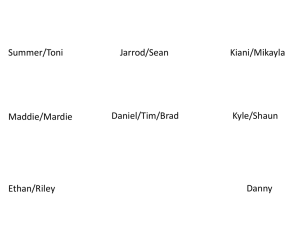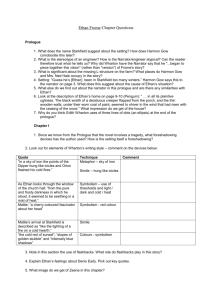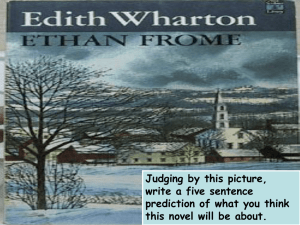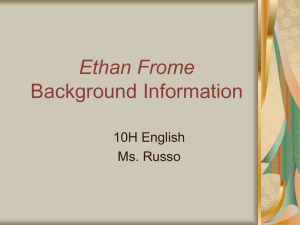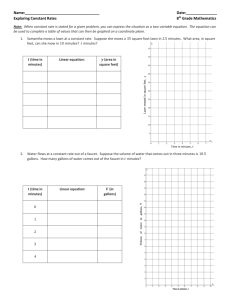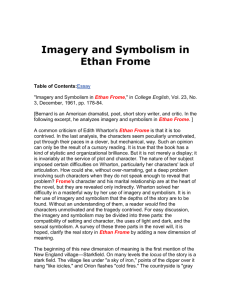Ethan Frome – introduction
advertisement
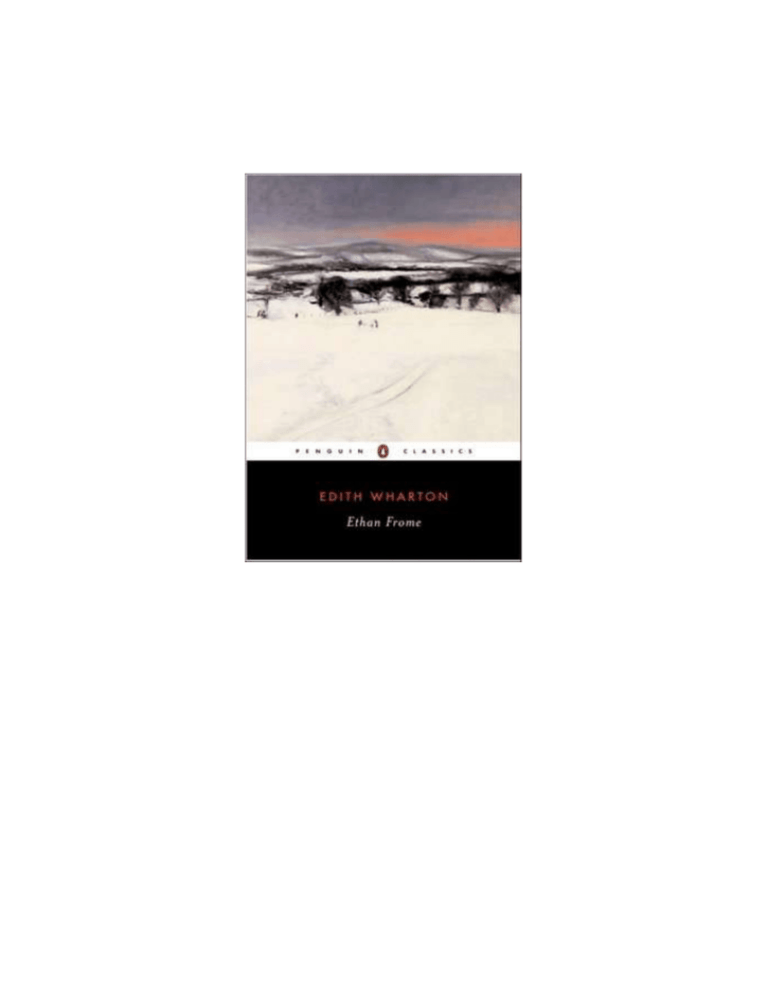
Context Edith Wharton was born Edith Jones into an upper-class New York City family in 1862. As was typical for members of her class at that time, Edith had a distant relationship with her parents. She received a marriage proposal at a young age, but the wedding was ultimately prevented because her prospective though that her family was snobbish. In 1885, at the age of twenty-three, Edith married Edward Wharton, an older man whom the Jones family found to be of suitably superior social rank. At an early stage the marriage turned sour, but Wharton remained with her husband for well over twenty years. She finally divorced him in 1913, although she never renounced his family name. Temptations of illicit passion The temptations of illicit passion constitute an undeniable focus of Wharton’s fiction, and many have pointed to Wharton’s unhappy marriage as an explanation. Indeed, Wharton’s very success as a writer, so unusual for a woman of her era, may be credited to the fact that her unhappy marriage forced her to devote her energies elsewhere. In fact, Wharton was advised by her doctor to take up the writing of fiction more seriously in order to relieve tension and stress. Divorce and then success Eventually, Wharton found temporary solace in her secret affair with the journalist Morton Fullerton, which coincided with the disintegration of her marriage. It was in the wake of this affair and her ensuing divorce that Wharton wrote many of her most successful and enduring works. Prize-winning writer In 1921, Wharton won the Pulitzer Prize for her highly esteemed novel The Age of Innocence. She continued to write novels throughout the 1920s, and, in 1934, she wrote her autobiography, A Backward Glance. In 1937, after nearly half a century of devotion to the art of fiction, Edith Wharton died in her villa near Paris at the age of seventy-five. Source: Sparknotes http://www.sparknotes.com/lit/frome/context.html Ethan Frome – introduction Main characters Ethan Frome - The protagonist of the story, Ethan is a farmer whose family has lived and died on the same Massachusetts farm for generations. A sensitive figure, Ethan has a deep, almost mystical appreciation of nature, and he feels a strong connection to the youth, beauty, and vital spirit of Mattie Silver, his wife’s cousin. Zenobia Frome - Ethan’s sickly wife, more commonly known as “Zeena.” She comes across as prematurely aged, caustic in temperament, prone to alternating fits of silence and rage, and utterly unattractive, making her the novel’s least sympathetic figure. Mattie Silver - Zeena’s cousin, who comes to assist the Fromes with their domestic tasks. Attractive, young, and energetic, Mattie becomes the object of Ethan’s affection. The Narrator - Although he recounts the story’s events, the narrator (an engineer by profession) plays no part in the story itself. Denis Eady - The son of Starkfield’s rich Irish grocer, Michael Eady, and sometime-suitor of Mattie Silver. Jotham Powell - The hired man on the Frome farm. Powell’s main duty is to assist Ethan in the cutting, loading, and auling of lumber The story of Ethan Frome is narrated by an engineer who is working in the region of Starkfield in New England towards the end of the 19th century. Ethan Frome is a strikingly tall, handsome but silent, remote figure with a scar on his face. The engineer tries to find out more about him by talking to different residents of the village but is unable to patch together a coherent narrative from the details he is able to get from them. Having asked Frome to take him to a from a nearby railway station for his daily journey to work through the frozen winter landscape, the engineer is taken to visit Frome’s farm. It is after this visit that he constructs his own version of Frome’s story. The story at the heart of the novella is therefore told in retrospect, a flashback. Most of the events had already taken place before the engineer came to stay in Starkfield. The conclusion, however, happens while he is there and is based on the narrator’s own direct experience. Atmosphere and setting Motifs, symbols and themes Themes Duty to the family vs. following one’s dream. Society and conventional morality as barriers to the fulfilment of desire. Confronting a personal moral dilemma. Living with the consequences of our choices. The influence of climate and geographical isolation on culture and character. The subtle foreshadowing that Wharton uses throughout the story may go unnoticed on a first reading, but it plays an instrumental role in the overall conception of this beautiful, tragic romance of Puritan New England. The very name of the town, Starkfield, evokes the bleak mood and rural atmosphere of the story. Images of snow, ice, and cold dominate the descriptive language of the story, forming one of the novel’s most important networks of motifs. Paying particularly close attention to the relationship between the landscape and its inhabitants, Wharton emphasizes the way geography shapes human lives. She paints Frome as an “incarnation” of the silent, melancholy, and frozen countryside. Frome’s cold demeanor is the emotional reflection of his physical environment. The language of Ethan Frome Motifs Example: Snow and cold. Symbols When I had been there a little longer, and had seen this phase of crystal clearness followed by long stretches of sunless cold; when the storms of February had pitched their white tents about the devoted village and the wild cavalry of March winds had charged down to their support; I began to understand why Starkfield emerged from its six months’ siege like a starved garrison capitulating without quarter. A red scarf and a red ribbon Example: Illness and disability. Mental and emotional instability. A dish Landscape The night sky He knew that most young men made nothing at all of giving a pretty girl a kiss, and he remembered that the night before, when he had put his arm about Mattie, she had not resisted. But that had been out-of-doors, under the open irresponsible night. Now, in the warm lamplit room, with all its ancient implications of conformity and order, she seemed infinitely farther away from him and more unapproachable. Example: For a moment such a flame of hate rose in him that it ran down his arm and clenched his fist against her. He took a wild step forward and then stopped. “You’re—you’re not coming down?” he said in a bewildered voice. Chapter by Chapter Prologue 1. What does the name Starkfield suggest about the setting? How does Herman Gow corroborate this later? 2. What is the stereotype of an engineer? How is the Narrator/engineer atypical? Can the reader therefore trust what he tells us? Why did Wharton have the Narrator say that he "...began to piece together this vision" of Frome's story? 3. What is significant about the missing L-structure on the farm? 4. What places do Herman Gow and Mrs. Ned Hale occupy in the story? Chapter I 1. Since we know from the Prologue that the novel involves a tragedy, what foreshadowing devices has the author used? How is the setting itself a foreshadowing? Chapter II 1. 2. 3. 4. 5. How does Ethan reveal that he feels ambivalent? What foreshadowing is used in this chapter? How is Ethan's conflict between his feelings for Mattie and those for Zeena voiced? Why is the missing door key significant? How are Mattie and Zeena contrasted, physically? Chapter III 1. How are the two women contrasted psychologically? 2. How is Ethan's conflict intensified in this chapter? Synthesis: Prologue-Chapter III Explain how each of the following quotations is significant to this section of the novel. What does each reveal about the characters, conflict, or theme? 1. "He's looked that way ever since he had his smash-up; and that's twenty-four years ago come next February." (p. 4) 2. "I merely felt in her an insurmountable reluctance to speak of him and his affairs...." (p. 8) 3. When Mattie says, referring to a group of clouds overhead, "`It looks just as if it was painted,' it seemed to Ethan that the art of definition could go no farther, and that words had at last been found to utter his secret soul...." (p. 26) 4. "I guess you're always late, now you shave every morning." (p. 29) 5. "His glance crossed Mattie's and he fancied that a fugitive warning gleamed through her lashes." (p. 41) 6. "Though she was but seven years her husband's senior, and he was only twenty-eight, she was already an old woman." (p. 48) . Suggested Activities: Prologue - Chapter III 1. Conflict. Illustrate Ethan's conflict between his feelings for Mattie and his sense of duty in one of the following ways: o Write a stream of consciousness-type dialogue he might have with his conscience. o Create a visual representation of his ambivalence. o With a partner act out the ambivalence - one portraying Ethan, the other his conscience. o Voice Ethan's feelings while appropriate music, representing his inner emotions, is played in the background. 2. Point of View. To emphasize the fact that Ethan Frome suggests varying points of view, students can conduct a man-on-the-street interview with Mr. Gow, Mrs. Hale, or Denis Eady. One student can portray a reporter who has heard about a tragedy in Starkfield and is there to learn some behind-the-scenes information. Questions: Chapters IV-VI Chapter IV 1. What traits in Ethan's character are emphasized? 2. Comment on Wharton's use of descriptive language in this chapter, particularly to adjectives referring to color. Why are they significant? Chapter V * What basic difference between Ethan and Mattie is highlighted in this chapter? Chapter VI 1. How has the evening without Zeena altered Ethan's perception of his daily routine? Synthesis: Chapters IV-VI What do these statements reveal about the characters? 1. "...He had secretly gloried in being clapped on the back and hailed as `Old Ethe' or `Old Stiff'..." (p. 51). 2. "...He had never known such a thrilling sense of mastery" (p. 64). 3. "Now, in the warm lamplit room, with all its ancient implications of conformity and order, she seemed...more approachable" (p. 68). 4. "I don't know. She went right up to her room" (p. 77). At this point in the novel, the salient theme, Ethan's struggle between passion and duty, is highlighted. His feelings are clear, but his habits of responsibility and conformity are ingrained. He enjoys his newly-awakened masculinity as he brags that he can guide himself and Mattie past the old elm as safely and as surely as he can mend the dish before Zeena discovers the damage. Will this heady feeling be strong enough to withstand the decision to sever the marriage bonds? At this point, the reader still feels sympathy for the lovers' plight and believes what the Narrator tells is true, namely that Ethan is the victim of an unsatisfying marriage. Suggested Activities for Chapters IV-VI 1. Plot. Write down as many facts about the Frome marriage (including previous occupations; how they met) as possible. After the reading, rank the facts as to which you consider the greatest cause of unhappiness. Questions: Chapter VII-Epilogue Chapter VII 1. How does Zeena's news about hiring Mattie's replacement affect Ethan? 2. Why can this chapter be considered the climax of the novel? Chapter VIII 1. In this chapter, Ethan weighs his options. How is his decision to maintain the status quo in keeping with his personality? 2. Why does he not consider his obligation to Mattie? What will his decision to remain with Zeena do to Mattie? Is this fair? 3. How do Wharton's descriptions mirror Ethan's state of mind and foreshadow the end? Chapter IX 1. How is Zeena's reaction to Mattie's departure a contrast to Ethan's? What are the implications of her behavior? 2. Comment on the irony of Ethan's defiance of her command to stay home and let Jotham drive Mattie to the station. 3. Why does suicide seem logical? Is this decision a solution or a "cop-out?" Epilogue 1. How is the reader surprised 2. How does the Narrator deal with the story now? 3. * What is ironic about Mrs. Hale's interpretation? Synthesis: Chapter VII - Epilogue What do these quotes from the novel reveal? 1. "It was as senseless and savage as a physical fight between two enemies in the darkness" (p. 83). 2. "I'm going to try my luck West" (p. 97). 3. "He turned and walked slowly back to the farm" (p. 119). 4. * "I could go down this hill with my eyes tied!" (p. 119). Stresses and Conflicts Ethan Ethan 1. What are the forces operating within Ethan? In which directions are they pulling him? 2. How does he try to resolve this inner struggle? Symbols Red scarf Red hair ribbon Pickle dish New England winter Basic Facts full title · Ethan Frome author · Edith Wharton type of work · Novel genre · Tragic romance language · English time and place written · 1910, in Paris date of first publication · 1911 publisher · Scribner’s, New York narrator · An anonymous visitor to Starkfield, Massachusetts, narrates the introduction and conclusion. In Chapters I–IV, the story flashes back approximately twenty years to Ethan Frome’s youth and the first--person narration gives way to a limited third-person narration (predominantly reflecting Ethan Frome’s point of view). point of view · tone · Foreboding, bleak, ironic, tragic, spare tense · Past setting (time) · The late nineteenth–early twentieth century setting (place) · Starkfield, Massachusetts protagonist · Ethan Frome major conflict · . rising action · climax · falling action · foreshadowing
